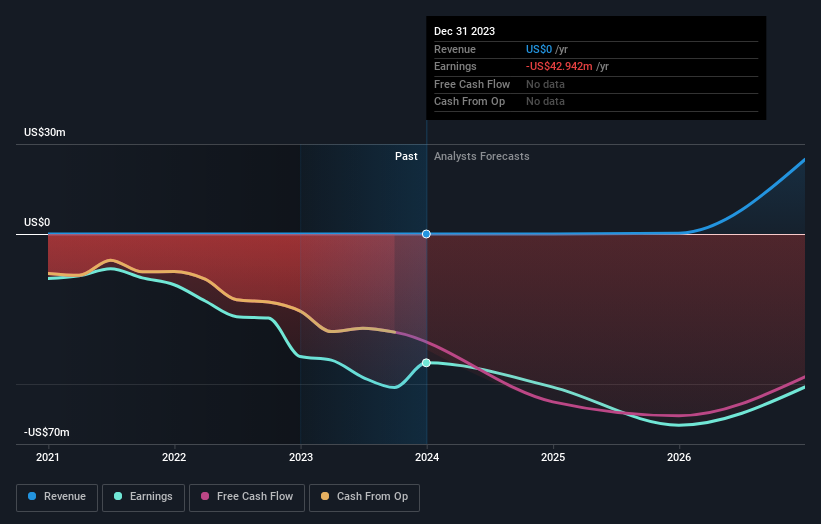PDS Biotechnology Corporation's (NASDAQ:PDSB) market cap dropped US$1.5m last week; individual investors who hold 59% were hit as were institutions
Key Insights
Significant control over PDS Biotechnology by retail investors implies that the general public has more power to influence management and governance-related decisions
A total of 25 investors have a majority stake in the company with 28% ownership
If you want to know who really controls PDS Biotechnology Corporation (NASDAQ:PDSB), then you'll have to look at the makeup of its share registry. The group holding the most number of shares in the company, around 59% to be precise, is retail investors. That is, the group stands to benefit the most if the stock rises (or lose the most if there is a downturn).
While the holdings of retail investors took a hit after last week’s 14% price drop, institutions with their 23% holdings also suffered.
Let's delve deeper into each type of owner of PDS Biotechnology, beginning with the chart below.
View our latest analysis for PDS Biotechnology
What Does The Institutional Ownership Tell Us About PDS Biotechnology?
Many institutions measure their performance against an index that approximates the local market. So they usually pay more attention to companies that are included in major indices.
PDS Biotechnology already has institutions on the share registry. Indeed, they own a respectable stake in the company. This can indicate that the company has a certain degree of credibility in the investment community. However, it is best to be wary of relying on the supposed validation that comes with institutional investors. They too, get it wrong sometimes. If multiple institutions change their view on a stock at the same time, you could see the share price drop fast. It's therefore worth looking at PDS Biotechnology's earnings history below. Of course, the future is what really matters.
Hedge funds don't have many shares in PDS Biotechnology. Our data shows that BlackRock, Inc. is the largest shareholder with 6.0% of shares outstanding. For context, the second largest shareholder holds about 4.8% of the shares outstanding, followed by an ownership of 2.2% by the third-largest shareholder. Frank Bedu-Addo, who is the third-largest shareholder, also happens to hold the title of Member of the Board of Directors.
On studying our ownership data, we found that 25 of the top shareholders collectively own less than 50% of the share register, implying that no single individual has a majority interest.
Researching institutional ownership is a good way to gauge and filter a stock's expected performance. The same can be achieved by studying analyst sentiments. Quite a few analysts cover the stock, so you could look into forecast growth quite easily.
Insider Ownership Of PDS Biotechnology
The definition of company insiders can be subjective and does vary between jurisdictions. Our data reflects individual insiders, capturing board members at the very least. The company management answer to the board and the latter should represent the interests of shareholders. Notably, sometimes top-level managers are on the board themselves.
Insider ownership is positive when it signals leadership are thinking like the true owners of the company. However, high insider ownership can also give immense power to a small group within the company. This can be negative in some circumstances.
Our most recent data indicates that insiders own some shares in PDS Biotechnology Corporation. In their own names, insiders own US$5.0m worth of stock in the US$145m company. Some would say this shows alignment of interests between shareholders and the board, though we generally prefer to see bigger insider holdings. But it might be worth checking if those insiders have been selling.
General Public Ownership
The general public -- including retail investors -- own 59% of PDS Biotechnology. This size of ownership gives investors from the general public some collective power. They can and probably do influence decisions on executive compensation, dividend policies and proposed business acquisitions.
Next Steps:
While it is well worth considering the different groups that own a company, there are other factors that are even more important. Case in point: We've spotted 5 warning signs for PDS Biotechnology you should be aware of, and 2 of them can't be ignored.
If you are like me, you may want to think about whether this company will grow or shrink. Luckily, you can check this free report showing analyst forecasts for its future.
NB: Figures in this article are calculated using data from the last twelve months, which refer to the 12-month period ending on the last date of the month the financial statement is dated. This may not be consistent with full year annual report figures.
Have feedback on this article? Concerned about the content? Get in touch with us directly. Alternatively, email editorial-team (at) simplywallst.com.
This article by Simply Wall St is general in nature. We provide commentary based on historical data and analyst forecasts only using an unbiased methodology and our articles are not intended to be financial advice. It does not constitute a recommendation to buy or sell any stock, and does not take account of your objectives, or your financial situation. We aim to bring you long-term focused analysis driven by fundamental data. Note that our analysis may not factor in the latest price-sensitive company announcements or qualitative material. Simply Wall St has no position in any stocks mentioned.


